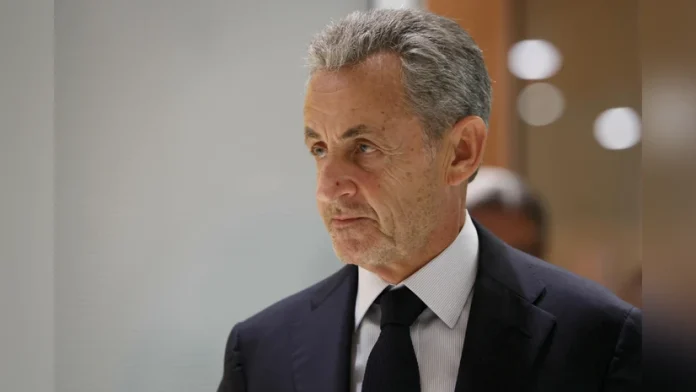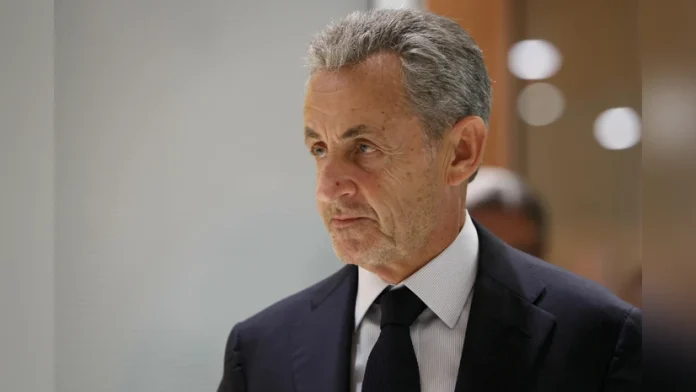
Former French President Nicolas Sarkozy will walk through the gates of Paris’s La Santé Prison on Tuesday, October 21, becoming the first modern European Union head of state to serve actual time behind bars following his conviction for criminal conspiracy in the Libya campaign funding scandal.
The 70 year old was informed of his incarceration date on Monday, October 13, when he appeared at the National Financial Prosecutor’s Office to finalize the details. Despite having already filed an appeal, Sarkozy must begin serving his five year sentence immediately because the court ruled for provisional execution, citing the offenses as being of “exceptional gravity”.
The sentence marks a spectacular fall from grace for a man who once styled himself as France’s “hyper-president.” Sarkozy was found guilty on September 25 of criminal conspiracy for allowing his associates to seek campaign funding from late Libyan dictator Muammar Gaddafi’s regime for his victorious 2007 presidential bid. However, the court acquitted him of three other charges, including passive corruption and illegal campaign financing, saying there’s no evidence the money actually ended up in his campaign.
“If they absolutely want me to sleep in prison, I will sleep in prison, but with my head held high,” Sarkozy declared after the verdict, his voice thick with anger. In a recent interview with La Tribune Dimanche, he said he’d already packed his bags and feels calm, planning to spend his time writing a book.
For security reasons, Sarkozy will likely be placed in solitary confinement or La Santé’s so-called “VIP wing,” a unit reserved for vulnerable prisoners whose safety might be compromised among the general population. His nine square meter cell will include a cooking hob, fridge, television, shower, toilet, and a fixed telephone line allowing calls to approved numbers only. He’ll be permitted visitors three times per week and will take daily walks alone in a small courtyard.
The Libya case traces its origins to shocking claims in 2011 when Gaddafi himself and Libyan media alleged that his regime had secretly funneled millions of euros into Sarkozy’s campaign. Prosecutors argued Sarkozy struck a corrupt pact in 2005, when he was interior minister, promising to help rehabilitate Gaddafi’s international image after Libya was blamed for the 1988 Lockerbie bombing and the 1989 Niger plane bombing. The irony wasn’t lost on observers: Sarkozy later put France at the forefront of NATO air strikes in 2011 that helped topple the regime, and Gaddafi was captured and killed by rebels.
Key evidence included Franco-Lebanese businessman Ziad Takieddine’s 2016 filmed testimony that he delivered suitcases of cash from Tripoli to Sarkozy’s entourage, though he later retracted the statement in 2020, prompting accusations of witness tampering. In a dramatic twist, Takieddine died of a heart attack in Beirut just two days before the verdict.
Sarkozy’s right hand man, Claude Guéant, was sentenced to six years, while former minister Brice Hortefeux received two years. Sarkozy was also fined €100,000 and banned from holding public office.
This marks the latest chapter in a remarkable series of legal troubles for the conservative politician. Last year, France’s highest court upheld his conviction for bribery and influence peddling, sentencing him to one year of house arrest with an electronic bracelet, which he wore for three months before being granted conditional release in May. He’s also been convicted in another campaign financing case over his failed 2012 reelection bid, receiving six months in prison with another six suspended.
Following his corruption conviction, Sarkozy was stripped of France’s highest distinction, the Legion of Honour.
He’ll be the first French president imprisoned since Philippe Pétain, the Nazi collaborationist head of the Vichy regime during World War II. La Santé has housed some notorious figures over its 158 year history, including Venezuelan terrorist Carlos the Jackal, bank robber Jacques Mesrine, and Panamanian dictator Manuel Noriega. More recently, Jean-Luc Brunel, a close associate of convicted sex offender Jeffrey Epstein, was found dead in his cell there in 2022 while awaiting trial.
Once incarcerated, Sarkozy’s legal team can immediately request his release from the appeals court, which will have up to two months to decide. He could be freed under judicial supervision or placed under house arrest with an ankle monitor, depending on the court’s decision.
Public opinion appears divided but tilting toward support for the sentence. An Elabe poll found 61% of French citizens believe the imprisonment is fair, while 38% consider it unjust. The decision has drawn criticism from the political right, with far right leader Marine Le Pen warning it’s “a grave danger” that courts are opting for immediately enforceable rulings rather than waiting for appeals. She knows this all too well, having herself been handed an immediate five year ban from public office in March over EU funds embezzlement charges.
Sarkozy’s son, Louis, has reportedly called on supporters to gather outside the family home Tuesday morning to show solidarity. Meanwhile, Judge Nathalie Gavarino has received death threats since issuing the verdict, prompting President Emmanuel Macron to condemn the intimidation as unacceptable.
Despite his legal woes, Sarkozy remains an influential figure in conservative circles. He recently met with his former protégé, newly appointed Prime Minister Sébastien Lecornu, and continues to be consulted by key political figures. His wife, model and singer Carla Bruni-Sarkozy, has stood by him throughout, and she’ll likely be among the first to visit him in La Santé, making her possibly the first former supermodel to enter the notorious prison.
According to Le Figaro, Sarkozy held a farewell gathering Wednesday evening with about 100 former collaborators, including the current Élysée Palace secretary general, Emmanuel Moulin.
For a man who once wielded immense power from the Élysée Palace, Tuesday will bring a stark new reality. The cold steel of a prison cell door, a nine square meter space, and the monotonous routine of solitary confinement. But if Sarkozy’s defiant words are any indication, he intends to face it all with the same combative spirit that defined his presidency, convinced he’s the victim of a political vendetta rather than justice being served.
Whether France’s justice system is working as it should or has overstepped its bounds will likely be debated long after Sarkozy completes whatever portion of this sentence he ultimately serves. What’s certain is that Tuesday marks an unprecedented moment in modern European political history.
